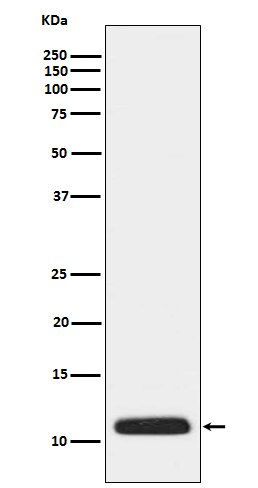
| WB | 咨询技术 | Human,Mouse,Rat |
| IF | 咨询技术 | Human,Mouse,Rat |
| IHC | 1/100-1/200 | Human,Mouse,Rat |
| ICC | 技术咨询 | Human,Mouse,Rat |
| FCM | 咨询技术 | Human,Mouse,Rat |
| Elisa | 咨询技术 | Human,Mouse,Rat |
| Aliases | APOC3; APO C3; Apo CIII; ApoC III; APOC3; ApoCIII; Apolipoprotein C III; Apolipoprotein C3;;Apolipoprotein C3 |
| WB Predicted band size | 11 kDa |
| Host/Isotype | Rabbit IgG |
| Antibody Type | Primary antibody |
| Storage | Store at 4°C short term. Aliquot and store at -20°C long term. Avoid freeze/thaw cycles. |
| Species Reactivity | Human |
| Immunogen | A synthesized peptide derived from human Apolipoprotein C3 |
| Formulation | Purified antibody in PBS with 0.05% sodium azide,0.05% BSA and 50% glycerol. |
+ +
以下是3篇关于APOC3抗体的代表性文献摘要(信息基于2023年前公开研究):
---
1. **文献名称**:*Antisense Inhibition of Apolipoprotein C-III in Patients with Hypertriglyceridemia*
**作者**:Gaudet, D. et al.
**摘要**:该研究报道了针对APOC3的antisense oligonucleotide药物(Volanesorsen)在家族性高甘油三酯血症患者中的临床试验,证实其可显著降低患者血浆甘油三酯水平,并可能减少胰腺炎风险。
---
2. **文献名称**:*APOC3 Antisense Oligonucleotides and Cardiovascular Disease*
**作者**:Witztum, J.L. & Gaudet, D.
**摘要**:综述APOC3在脂代谢中的作用机制,指出抑制APOC3表达可通过增强脂蛋白脂酶活性改善血脂异常,降低动脉粥样硬化风险,并讨论抗体及基因沉默疗法的临床转化潜力。
---
3. **文献名称**:*Loss-of-function mutations in APOC3 and risk of ischemic vascular disease*
**作者**:TG and HDL Working Group (Natarajan, P. et al.)
**摘要**:通过人群基因数据分析,发现APOC3功能缺失突变与低甘油三酯水平及心血管疾病风险降低相关,为APOC3抗体治疗提供了遗传学支持证据。
---
**注**:如需具体文献,建议通过PubMed或Google Scholar检索关键词“APOC3 antibody”“APOC3 inhibitor”获取最新研究。
APOC3 (apolipoprotein C3) is a key protein involved in lipid metabolism, primarily synthesized in the liver and secreted into the bloodstream. It plays a critical role in regulating triglyceride-rich lipoprotein metabolism by inhibiting lipoprotein lipase (LPL), the enzyme responsible for breaking down triglycerides in lipoproteins, and by impairing hepatic uptake of remnant particles. Elevated APOC3 levels are associated with hypertriglyceridemia, a risk factor for cardiovascular diseases (CVD), pancreatitis, and metabolic disorders. Genetic studies linking APOC3 loss-of-function mutations to reduced triglycerides and lower CVD risk have highlighted its therapeutic potential.
APOC3-targeted antibodies and related therapies aim to neutralize or suppress APOC3 activity, thereby enhancing LPL function and promoting triglyceride clearance. Monoclonal antibodies and antisense oligonucleotides (ASOs), such as volanesorsen, have been developed to inhibit APOC3 expression or function. Clinical trials have demonstrated significant triglyceride-lowering effects in patients with severe hypertriglyceridemia or familial chylomicronemia syndrome. However, challenges remain, including balancing efficacy with safety profiles—some therapies have shown side effects like thrombocytopenia. Ongoing research explores novel approaches, including RNA-based therapies and gene editing, to achieve sustained APOC3 suppression. By targeting APOC3. these therapies hold promise for reducing cardiovascular risk and improving outcomes in metabolic diseases, though long-term safety and broader clinical applicability require further investigation.
×